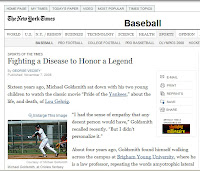Letters and comments to the Editors of the Wall Street Journal may be directed to
wsjcontact@dowjones.com
_______________________________
http://online.wsj.com/article/SB123059825583441193.html
OPINION
DECEMBER 30, 2008
The FDA Is Killing Crohn's Patients
Science didn't require that I get a placebo.
By GIDEON J. SOFER
Right now there are millions of individuals whose lives are
directly dependent on the rate at which new drugs come to market. I'm one of
them. I'm fighting for my life.
To date, half of my intestine has been removed to manage Crohn's disease. Last year, at
age 23, I enrolled in a clinical trial for a treatment that could save my life:
an adult stem-cell therapy that helps damaged intestinal tissue regenerate from
the relentless inflammation and scarring caused by Crohn's.
The sponsor, Osiris Therapeutics, reported that Crohn's patients in the therapy's Phase II
trial all experienced clinical improvement after receiving the cells. A Phase
III trial for the treatment is now nearing completion, but Food and Drug
Administration (FDA) approval could be years away, despite its FDA "fast track"
designation.
In accordance with antiquated FDA policies, the Phase III trial is randomized with three groups of patients, and double-blinded, which means neither the doctors nor patients are told what treatment is being administered. One group received full-strength stem cells, another received half-strength, and a third got a placebo (the proverbial "sugar pill"). It appears I got the placebo.
Foregoing all other treatments, I received the four scheduled infusions, and yet my
disease progressed with a vengeance. In a matter of weeks, I became dangerously
malnourished. I've since been readmitted to the hospital countless times, as my
doctors continue to plead with Osiris for information. But Osiris has refused,
citing adherence to FDA protocol.
I am now a lab rat. I have no right to know what happened to me in the study, nor do I
have a right to try the promising treatment as my health deteriorates. It
doesn't have to be this way.
Under the Fifth Amendment's guarantee that "No person shall be deprived of life, liberty or property without due process of law," a critically ill patient should have access to a potentially lifesaving drug that has been deemed safe for human consumption, if the patient agrees to
bear the risks involved. But earlier this year, the Supreme Court refused to
hear a case on the issue, denying countless patients their right to pursue life.
Thankfully, some members of Congress have stepped in to ensure our
rights as patients. In May, Sen. Sam Brownback (R., Kan.) and Rep. Diane Watson
(D., Calif.) introduced the Access, Compassion, Care and Ethics for Seriously
Ill Patients Act. If passed, this bipartisan legislation will begin to restore
the rights of millions of patients by widening access to promising
investigational drugs.
Human clinical research is an intricate scientific and moral process, but it does not justify taking immoral advantage of patients. Tragically, FDA and Osiris think it does.
Typical approval protocols almost always guarantee patients taking
the placebo access to the actual drug -- at the very least -- after the study
has ended. But in what appears to me a deliberate act of cruelty, Osiris hung
its patients out to dry without any recourse, refusing to confirm which patient
got what. The FDA has endorsed Osiris's decision by enabling it to proceed with
the study.
Withholding a potential cure is just as bad -- if not worse -- than the potential death sentence of a serious illness. If patients like myself have the audacity to put their lives on the line for the betterment of science and those in their predicament, their decision should not only be embraced, it should be rewarded.
Furthermore, trials without ethical recourse can lead to inadequate and
incomplete data, compromising the integrity of the study. If trial patients are
treated like lab rats, they won't feel obliged to cooperate unconditionally and
report accurate data -- something the FDA and the drug industry rely on heavily,
but have failed to consider.
Everyone agrees it is a fundamental right for patients to dictate their course of treatment with FDA-approved drugs. So why do the rules evaporate at the most critical moment, when the only life-preserving options are highly promising investigational drugs?
Mr. Sofer is a student at the University of California, Berkeley.
Write to gideon@berkeley.edu





